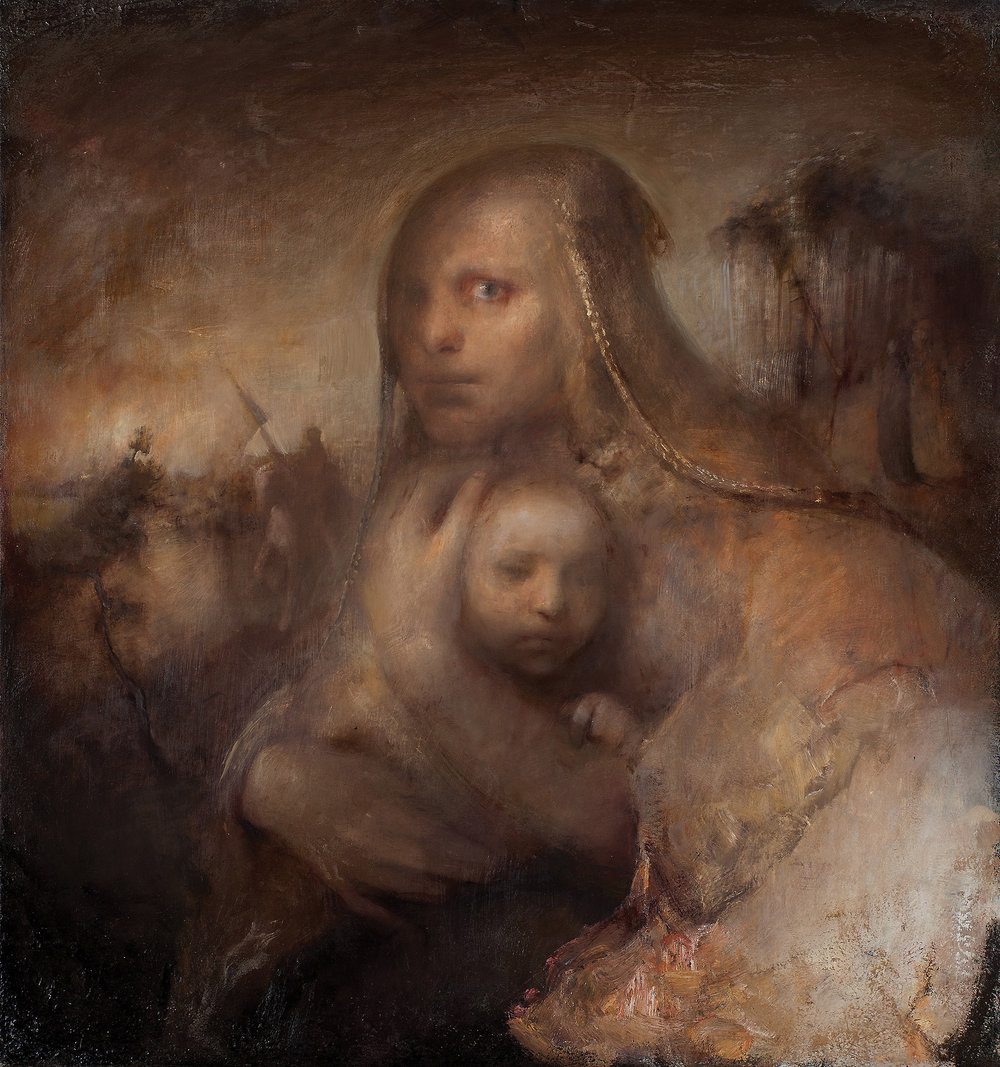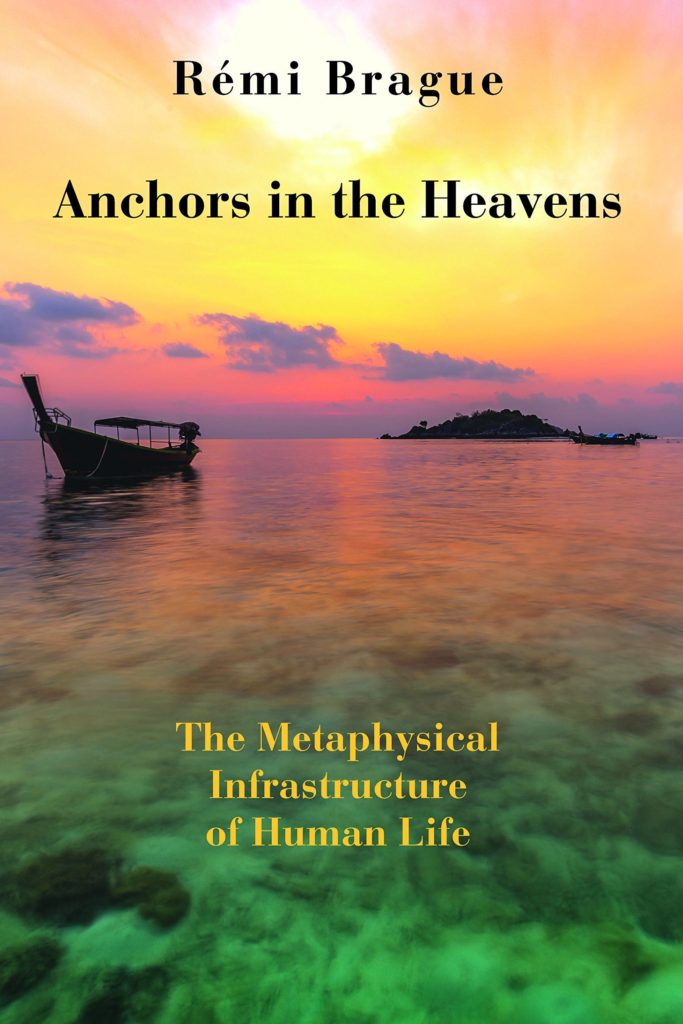Rémi Brague, in Anchors in Heaven: The Metaphysical Infrastructure of Human Life, is concerned with what has become a central question in prosperous Western societies: Should we have children? If the human species should go on existing (which is taken for granted in the book), what assumptions are required for us to keep it going?
This question becomes all the more urgent as we witness what Aron called the demographic suicide of Europe. Implicit in the latter concern is the suicide of European culture as opposed to Islamic families in Europe for whom this is apparently not an issue. This seems, as we shall see, to be a special problem for Western intellectuals.
One can offer many causes for this demographic suicide, but Brague is not interested in causes but in reasons. That is, he is interested in the philosophical rationales for not procreating that have appeared throughout the history of philosophy but which have intensified since the 19th-century vogue for nihilism.
Brague seeks to understand how philosophy could have evolved into this morass. In his short book, he launches into an impressive philosophical tour-de-force that will make quite a few demands on the reader. The subtitle of the book is “The Metaphysical Infrastructure of Human Life.” As I understand his account, metaphysics evolved into the central issue of “being,” or a concern with the fundamental truths.
While “Being” in classical and medieval thought was originally focused on the world as a whole, modern philosophy (Descartes onwards) changed the focus to how we come to know being, the “truth” about being, or a shift to epistemology. This evolved even further with Kant into a concern for the “human being” or knower. In the 19th-century, it became even more clear that the knower actually projects meaning or truth onto the world and this projection has both a history and many varieties. This led in turn to the question of whether what we project is “good?” Unfortunately, we no longer had any reference point for answering this question. It was a short step from this to the conclusion that there is no way of anchoring the “good.”
Philosophically, “life” had lost its meaning. Further elucidation did not help. While we might no longer fear death, we might fear the losing of our life. But even this fear does not amount to an argument for “giving” life in the act of procreation or “sacrificing” one’s life for someone else’s life. We might love (enjoy) living but this does not entail that we should love giving life. In fact, armed with a little bit of philosophical nihilism we might justify wallowing in what Nietzsche described as the life of the “last man,” focused only on personal pleasure.
What is required is a new kind of reason to give life. Once more returning to the philosophical tradition, Brague references those thinkers like Mirandola who saw that free will (not reason) is what was unique to humanity. Brague maintains that this makes preserving freedom an end-in-itself; and that, given our personal finitude, giving life to others (or sacrificing for others) through procreation is or should be our highest aspiration. In this, he claims to have established “The Anchors in the Heavens.”
Brague’s scholarship is impeccable and wide-ranging. One cannot but agree with his identification and formulation of the issue. In addition, I would subscribe personally and whole-heartedly to his conclusion that what distinguishes us is our free-will, that freedom is an end in itself, and we should give life to others. In what follows I want to arrive at the same conclusions by a slightly different route. I note with approval Brague’s referencing literary figures and others outside of the narrow field of philosophy.
What follows might seem like a lengthy digression, but the capacity of intellectuals to muddy the waters (this does not apply to Brague) seems to be without limits. The field of philosophy itself contributes to the problem.
The Troubles With Philosophy
I maintain that professional philosophy is an obstacle to understanding. I shall offer three arguments. The first is that a careful study of the history of so-called “philosophy” will show that philosophy has defined itself out of existence. Second, one major strand of contemporary philosophy, analytic philosophy, appeals to science in such a way that to do so is to allow science to engage in the assisted suicide of philosophy. Finally, the other major strand of contemporary philosophy, Continental philosophy, has reduced philosophy to mindless advocacy.
One of Brague’s earliest, and to me, most important points is terminological. “Metaphysics,” which is supposed to be the most fundamental part of philosophy, was originally, in classical Greek, ta meta ta physika, the title of one particular book or collection of Aristotle’s lectures. It is not a term from Plato or any earlier thinker. The expression might mean “after” or “before” the book entitled “physics.” It is not clear whether this was a name given by a librarian to identify the position of a “book” on a shelf, or perhaps meant to be read before the “physics” and therefore somehow more fundamental. A version of the expression appears in the third century Greek and in Arabic in the ninth century. The expression becomes a noun “metaphysics” in a twelfth-century translation into Latin, and its history continues thereafter.
I think a similar account can be given of the term “philosophy” itself. Is it a kind of book, a noun, an adjective, or a discipline? There is no continuous and unambiguous history of the discipline of “philosophy.” You would look in vain for an entry on “philosophy” in a contemporary dictionary of philosophy, or an encyclopedia of philosophy. To be sure, there is an Academic discipline called “philosophy,” but you would be hard-pressed to distinguish among “philosophers,” “teachers” of philosophy or “historians” of philosophy. Likewise, there are people called astrologers, books on astrology, etc., people who are paid to cast horoscopes as well as offer advice and make predictions. But, unfortunately, there is no connection between the positions of heavenly bodies and human destiny.
What does the History of “Philosophy” show us? In the beginning, no distinction was made among intellectual disciplines. One popular formulation of the differences (Frankfort) has been among three things:
Mythopoeic thought > Hebrew monotheism > Greek Philosophy (world explains itself).
Among the latter, Plato and Aristotle (responsible for two perennial but alternative modes of thought) have been the most influential, down to the present. Aristotle offered a history leading up to him; such teleological accounts keep reappearing depending upon who the historian is. This makes the history of philosophy and philosophy itself all about “me.” An important feature of this kind of history is the assumption that the same principles explain both the non-human and the human world.
An important transition occurred with the advent of modernity (Descartes to Kant), the recognition that meaning is something human beings project onto the world. Copernicanism upends the whole tradition – knowledge = how human beings understand the world. How we understand ourselves is fundamental; how we understand the non-human world is derivative.
Within the foregoing framework, the seventeenth-century introduced the distinction between natural philosophy (non-human world) and moral philosophy (human world). In the eighteenth-century, the human world became more complicated, as it was recognized that how we understand ourselves obviously has an historical dimension. This raises the current ongoing issue of relativism.
Hegel was, officially, the last philosopher to put it all together, specifically by making the knower and the known identical and by recognizing the historical nature of the whole. Hegel also recognized that the arts, religion, and philosophy were all different ways of expressing the same truth. It was now not clear what philosophy could be hereafter except a limited canon with some pretentious terminology. Some writers (Fukuyama on Kojeve) have interpreted Hegel so that liberal societies are the end of all history. Apparently, nobody has informed the Chinese about this.
Philosophy came to an end with Hegel. This is not meant either to praise or bury Hegel but to call attention to a discipline now without a role. It is my hope that this will also shed some light on the waste in the contemporary intellectual landscape. Nor is this meant to delegitimize everything done by people now associated with this “passé” discipline. Anybody in any discipline, who attempts to clarify concepts, identify basic presuppositions, and discuss the origin, history and evolution of our conceptual framework can be said to be doing philosophy.
Moral philosophy has subsequently evolved into myriad disciplines, known as the so-called “social sciences.” Here, the dance begins to repeat itself. Some understand the model of all science to be mathematics or physics; others prefer biological models; still others insist that the “social” sciences are not really sciences but either sui generis or ideologies masquerading as science.
Psychology, for example, claims to be the science of how we understand ourselves; but psychologists are split among those who think such a “science” is either “mechanical” (physics is the model), “organic” (biology is the model), or sui generis. If psychology is some kind of hard science, as analytic philosophers maintain, then philosophy has just defined itself out of existence. Philosophy can be no more than an account of the methodology and history of science, something done in other disciplines. What does philosophy mean now that it is not a separate discipline or subject matter?
Those who understand that the human/social world is sui generis, for example, Hayek, point out that both Hume and Kant saw that science rests upon values that cannot be scientifically certified. Some other kind of understanding is necessary. The best example of someone who makes this case today is Wayne Cristaudo in his recent (2020) book Idolizing the Idea. Philosophy is not about eternal truths. The proper role of philosophy is not to answer questions which require all sorts of extra-philosophical knowledge, but to question the questions that lead our inquiries about ourselves. In order to do this adequately requires a hermeneutical, dialogical, and anthropological approach.
The contemporary alternative to analytic philosophy is Continental philosophy (structuralism, deconstruction, postmodernism, etc.) They are all philosophies of anti-domination and limitless freedom. These too suffer from the failure to understand how the world came to be the way it is and why it is the way it is. Both major movements have become a major source of social ill, folly, and division.
Nicholas Capaldi, a Legendre-Soule Distinguished professor at Loyola University, New Orleans, USA, is the author of two books on David Hume, The Enlightenment Project in Analytic Conversation, biography of John Stuart Mill, Liberty and Equality in Political Economy: From Locke versus Rosseau to the Present, and, most recently, The Anglo-American Conception of the Rule of Law.
The image shows Frenzied Woman by Odd Nerdrum, painted 2005-2007.

